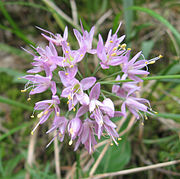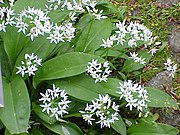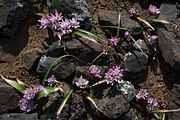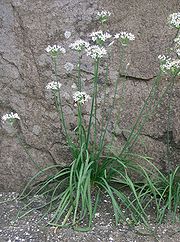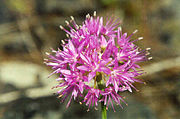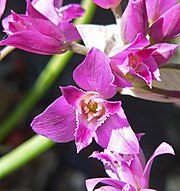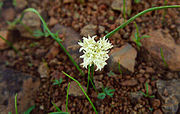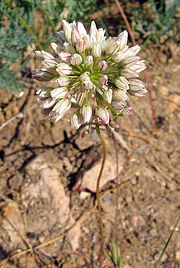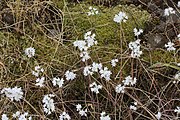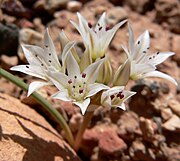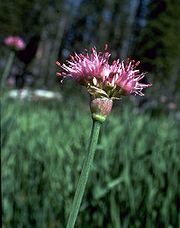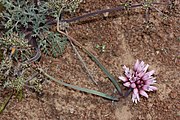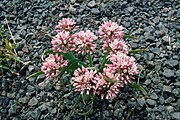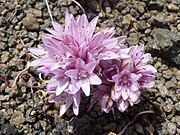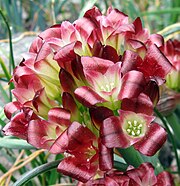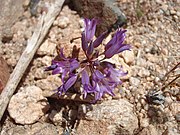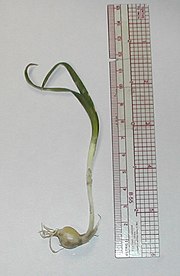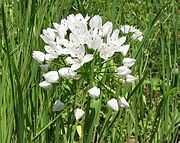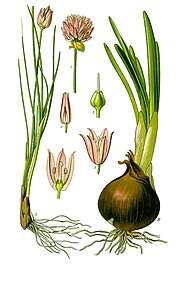
The shallot is a botanical variety of the onion. Until 2010, the shallot was classified as a separate species, Allium ascalonicum, a name that is a synonym of Allium cepa, the species name of the onion. A. cepa is the correct name for the shallot species.
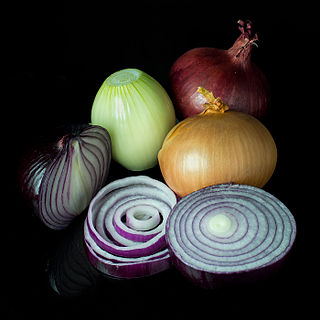
The onion, also known as the bulb onion or common onion, is a vegetable that is the most widely cultivated species of the genus Allium. The shallot is a botanical variety of the onion which was classified as a separate species until 2010.

Scallions are vegetables derived from various species in the genus Allium. Scallions generally have a milder taste than most onions and their close relatives include garlic, shallot, leek, chive, and Chinese onions.

Allium tuberosum is a species of plant native to the Chinese province of Shanxi, and cultivated and naturalized elsewhere in Asia and around the world.

Allium tricoccum is a North American species of wild onion widespread across eastern Canada and the eastern United States. Many of the common English names for this plant are also used for other Allium species, particularly the similar Allium ursinum, which is native to Europe and Asia.
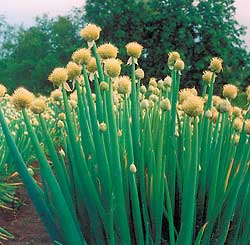
Allium fistulosum, the Welsh onion, also commonly called bunching onion, long green onion, Japanese bunching onion, and spring onion, is a species of perennial plant, often considered to be a kind of scallion.
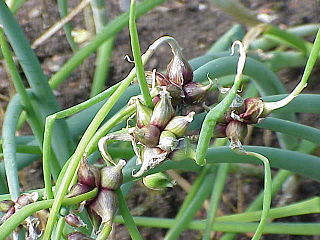
The tree onion is a plant similar to the common onion (A. cepa), but with a cluster of bulblets where a normal onion would have flowers. Tree onions are also known as topsetting onions, walking onions, or Egyptian onions. Genomic evidence has conclusively shown that they are a hybrid of the common onion and the Welsh onion (A. fistulosum). However, some sources may still treat the tree onion as A. cepa var. proliferum or A. cepa Proliferum Group. Tree onion bulblets will sprout and grow while still on the original stalk. They may bend down under the weight of the new growth and take root some distance from the parent plant, giving rise to the name "walking onion". It has been postulated that the name "Egyptian onion" derived from Romani people bringing tree onions to Europe from the Indian subcontinent.

Allium vineale is a perennial, bulb-forming species of wild onion, native to Europe, northwestern Africa and the Middle East. The species was introduced in Australia and North America, where it has become a noxious weed.

Allium canadense, the Canada onion, Canadian garlic, wild garlic, meadow garlic and wild onion is a perennial plant native to eastern North America from Texas to Florida to New Brunswick to Montana. The species is also cultivated in other regions as an ornamental and as a garden culinary herb. The plant is also reportedly naturalized in Cuba.
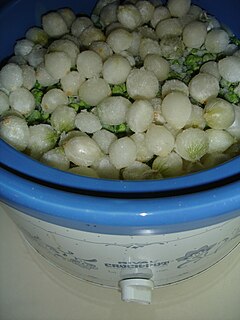
The pearl onion, also known as button, baby or silverskin onions in the UK, is a close relative of the leek, and may be distinguished from common onions by having only a single storage leaf, similar to cloves of garlic. In French they are known as oignon grelot. One English-speaking reference also mentions the term petit poireau antillais.

Allium chinense is an edible species of Allium, native to China, and cultivated in many other countries. Its close relatives include the onion, shallot, leek, chive, and garlic.

Allium giganteum, common name giant onion, is an Asian species of onion, native to central and southwestern Asia but cultivated in many countries as a flowering garden plant. It is the tallest species of Allium in common cultivation, growing to 1.5 metres (4.9 ft).
Leveillula taurica is an obligate fungal pathogen, from the phylum Ascomycota, which causes powdery mildew on onion. This disease prefers warm, dry environments. It is rare in the United States, and is currently restricted to western states. Globally, it is also a minor problem with limited occurrences in the Middle East, Europe, and South America. L. taurica causes powdery mildew of onions, but is also known to infect other allium, solanaceous, and cucurbit species. The disease has appeared in parts of the Middle East, the Mediterranean, and South and North America. Currently, it is not a cause for major concern in the U.S. and throughout the world, as its geographic extent is sparse. In addition, it is relatively easy to control through basic sanitation and reducing water stress.

Ipheion uniflorum is a species of flowering plant, related to the onions, so is placed in the allium subfamily (Allioideae) of the Amaryllidaceae. It is known by the common name springstar, or spring starflower. Along with all the species of the genus Ipheion, some sources place it in the genus Tristagma, but research published in 2010 suggested that this is not correct. It is native to Argentina and Uruguay, but is widely cultivated as an ornamental and reportedly naturalized in Great Britain, France, Australia, New Zealand and the United States.

Allium senescens, commonly called aging chive, German garlic, or broadleaf chives, is a species of flowering plant in the genus Allium.
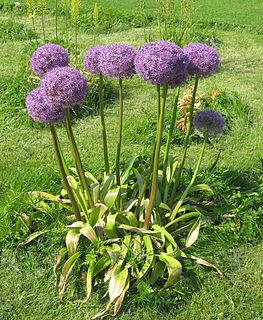
Allium hollandicum, the Persian onion or Dutch garlic, is a species of flowering plant native to Iran and Kyrgyzstan but widely cultivated as an ornamental because of its umbels of attractive purple flowers. It is reportedly naturalized in Saint Louis County, Minnesota.
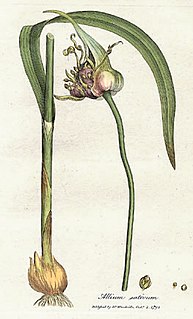
Allium is a genus of monocotyledonous flowering plants that includes hundreds of species, including the cultivated onion, garlic, scallion, shallot, leek, and chives. The generic name Allium is the Latin word for garlic, and the type species for the genus is Allium sativum which means "cultivated garlic".

The leek is a vegetable, a cultivar of Allium ampeloprasum, the broadleaf wild leek. The edible part of the plant is a bundle of leaf sheaths that is sometimes erroneously called a stem or stalk. The genus Allium also contains the onion, garlic, shallot, scallion, chive, and Chinese onion. Three closely related vegetables, elephant garlic, kurrat and Persian leek or tareh, are also cultivars of A. ampeloprasum, although different in their uses as food.
Leek yellow stripe virus (LYSV) belongs to the genus Potyvirus. It was first detected in leek but also infects garlic and onion worldwide. Economically less important Allium spp., such as Allium angulosum, Allium caeruleum, Allium cyathophorum, Allium nutans, Allium scorodoprasum, Allium senescens subsp. montanum were also found to harbor the virus.

